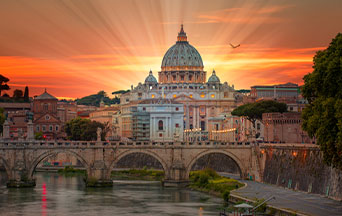
July 18, 1870 was a bellweather day for the entire Church. After all the discussions, debates and discords, it was time for the public session promulgating the dogma of infallibility. At nine o’clock, Cardinal Lorenzo Barilli celebrated the Mass of the Holy Spirit. At the end of the Holy Sacrifice, the pope, clad in the pontifical vestments, entered the Council Hall, where the bishops were waiting. Pius IX took his place on the Papal throne. He was assisted by Cardinals Filippo de Angelis, Gaspare Grasselini, and Teodolfo Mertel. Bishop Josef Fressler of Sankt Pölten, the Secretary of the Council, placed the Gospels on a small velvet throne prepared in advance. The pontiff and all the bishops knelt and said the prayer Adsumus Domine, Sancte Spiritus. At the end of the prayer, Pius IX stood up and blessed the Council six times.
After the ritual prayers, Bishop Fressler announced that the session was about to begin. As was the usual custom, the Bishop was going to ask the audience to leave. However, Pope Pius ordered that the faithful also be allowed to witness the proclamation about to be made.
Pius IX gave the original text of the constitution about to be voted upon to Bishop Fressler. The Bishop, in turn, passed it to Bishop Antonio Maria Valenziani of Fabriano e Matelica. The latter read the document’s title, standing up with his head uncovered. Then, donning a biretta, he sat down and read the text.
Why America Must Reject Isolationism and Its Dangers
The Council fathers could only vote “placet” (approved) or “non-placet” (not approved). Since almost the entire minority had withdrawn, the Council expected minimal dissenting voices. Yet, another surprise was in store. Six minority members were present-the archbishops of Reims, Avignon, and Sens, as well as the bishops of Viviers, Casazzo, and Little Rock. However, only the last two voted against infallibility. The document was thus approved by 538 Council Fathers and rejected by only two-Bishop Luigi Riccio of Casazzo in the Kingdom of Naples and Bishop Eduardo Fitzgerald of Little Rock in the United States.
As soon as he learned the result, the pontiff proclaimed and sanctioned it with the words: “Decreta et canones, qui in constitutione modo lecta continentur, placuerunt fere omnibus Patribus. Nosque sacro approbante Concilio, illa et illos, ut lecta sunt, definimus et apostolica auctoritate confirmamus.” [The decrees and canons contained in the just read constitution have pleased almost all Fathers. And We, with the sacred Council’s approval, define them as read and confirm them with the apostolic authority].
Pius IX pronounced these words in great serenity, calming the violent storm that had raged over Rome during the session. An enormous enthusiasm immediately seized the audience. All one could hear were cries of “Long live Pius IX!” and “Long live the infallible pope!” At the moment of approval, a ray of sunlight illuminated the entire Council Hall.
When he was able to speak again, the pope emotionally addressed the absent minority bishops. With an emotional and solemn voice, he said:
“The authority of the sovereign pontiff is great but does not destroy. It does not oppress but upholds and often defends the rights of Our brethren, the bishops. If some did not vote with us, know that they voted for disruption and that the Lord is not in turmoil. Remember that they agreed with Us and this vast assembly a few years ago. What has happened? Do they have two minds and two wills on the same point? God forbid. We, therefore, ask God, Who alone works great wonders, to enlighten their souls and hearts to return to the bosom of their father, the Sovereign Pontiff, unworthy Vicar of Jesus Christ, to embrace him and work with Us against the enemies of the Church of God. Grant, O God, that they may say with Augustine: ‘My God, Thou hast given me Thy admirable light, and behold, I see.’ Oh, grant that all may see! May God spread His blessings upon you!”
After the Te Deum, the Holy Father again blessed the Council and left.
The two bishops who voted against infallibility submitted immediately. Some participants said these two attended the session only because they missed the meeting, during which the minority decided to leave.
Eternal and Natural Law: The Foundation of Morals and Law
The next day, July 19, 1870, France declared war on Prussia. It withdrew its troops, who were previously in charge of securing the Papal States. In the troops’ absence, Austria was supposed to protect the Holy See. Instead, Austria proposed to Napoleon III that they hand Rome over to the House of Savoy. Victor Emanuel II, the Italian king, immediately went into action. On September 11, 60,000 men invaded the Church’s territories. On October 20, the pope published a bull suspending the Council. “We have decided,” the document said, “to postpone the sessions to a later time. We declare the Council suspended, and beseech God, Lord and Avenger of His Church, to restore peace and freedom to His faithful Spouse soon.”
Indeed, as the crisis gathered, the Council had hardly functioned since the promulgation of infallibility. France–s declaration of war brought unrest to Europe. Most bishops returned to their dioceses. The Council, prevented from completing its great work, was not officially closed until 1960.
Photo Credit: © muratart – stock.adobe.com

